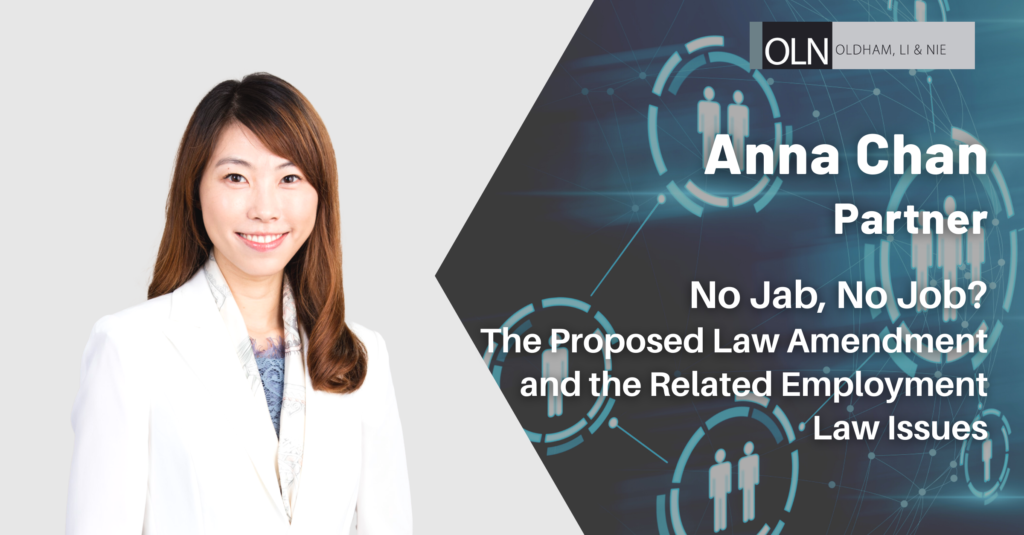No Jab, No Job? – The Proposed Law Amendment and the Related Employment Law Issues
23 2月 2022

Due to the recent outbreak of Covid-19 cases in Hong Kong, the Government has recently imposed a series of new restrictions, the toughest since the start of the pandemic, and proposed to amend the Employment Ordinance (Cap. 57) to handle employment issues arising from these restrictions.
The topic of mandatory vaccination is a sensitive one, and with growing pressure to get vaccinated, Hong Kong employers may soon face hard decisions when the consequential employment issues come into play.
“Vaccine Pass” Requirement
Starting from 24 February 2022, non-exempted individuals will have to comply with the vaccine pass requirement to enter into certain specified premises, such as shopping malls, supermarkets and religious premises.
The vaccine pass will be rolled out in Hong Kong in 3 stages:
Stage 1: Starting from 24 February 2022, all individuals over 12 years old need to have at least 1 dose of vaccine.
Stage 2: By the end of April 2022, at least 2 doses of vaccine will be required for all individuals over 18 years old, and at least 1 dose of vaccine for all individuals aged 12 to 17.
Stage 3: From the end of June 2022, all adults who were vaccinated more than nine months ago will need to get a booster shot, while 12- to 17-year-olds will have to receive a second dose six months after the first.
The new “Vaccine Pass” requirement may lead to bizarre situation where unvaccinated employees may be unable to physically attend offices which are connected to malls. The government announcement provides a list of exempted scenarios to the Vaccine Pass arrangement which include the purchase or taking of takeaway food. It is noteworthy that the commuting to and from work is not written in the list of exempted scenarios. The Deputy Secretary for Good and Health at a recent press release, however, said employees who are on their way to their workplaces would be exempted by the Vaccine Pass arrangement. How the law enforcers would enforce the Vaccine Pass arrangement in actuality remains to be seen.
Dismissal for Non-compliance with Vaccine Pass will No Longer be Treated as Unfair
Current law:
Under the current provisions of the Employment Ordinance (Cap. 57), there are five valid reasons for dismissal or variation of the terms of an employment, namely reasons related to:-
(a) the conduct of the employee;
(b) the capability or qualification to perform work;
(c) redundancy or other genuine operational requirements of the business;
(d) statutory requirements; or
(e) other substantial reasons.
If an employee has been employed under a continuous contract for not less than 24 months and is dismissed by the employer without a valid reason as specified above, the dismissal would be unreasonable.
Before the proposed amendments are inaugurated, if an employer terminates an employee’s job because the latter cannot report duty due to non-vaccination, arguably this does not fall within the five valid reasons stated above and the employer may run the risk of unreasonable dismissal.
It is also worth noting that, under the existing law, certain categories of employees are given special protection from termination. For instance, an employer may not dismiss employee who is on sick leave, pregnant or is involved in trade union activities, except in cases of summary dismissal due to serious misconduct.
Proposed amendments:
Amongst other proposed amendments, the Hong Kong government now proposes to amend the Employment Ordinance to the effect that it will not be considered unreasonable dismissal to dismiss an employee who is legally required to report for duty with Vaccine Pass but refuses to do so and hence cannot go to work.
Some question marks on the proposed amendments:
At this stage, the proposed amendments come with some ambiguities, and disputes may arise out of them.
For instance, at present only employees from certain industries such as catering are “legally required” to get vaccinated. Employees who are not client-facing or whose job nature does not require much interaction with others arguably would not be legally obliged to get vaccinated. If the employers rely on the non-compliance of Vaccine Pass to dismiss such type of employees, would such dismissal become an unfair and thus a wrongful one?
Also, as stated above, it is well known fact that termination of employees who are on sick leave or have served notices of pregnancy would be illegal. However, if the pregnant employee refuses to get vaccinated based on the very reason that vaccination might harm her pregnancy, can the employer safely rely on the law amendment to terminate such pregnant employee?
There does not seem to be a clear-cut answer for that. The exact wordings of the intended amendments also remain uncertain and the law is yet to be tested in this regard.
Needless to say, terminating an employee on the new grounds would be risky – it also requires a close analysis of the individual circumstances and the relevant policies at the time. We strongly advise employers to obtain legal advice before proceeding with any action.
Employees under Mandatory Quarantine Order are Entitled to Paid Sick Leave
Another proposed amendment to the employment law concerns statutory sick leave. According to new provisions, employers cannot dismiss their staff simply due to a Government-imposed lockdown of the buildings they live in or mandatory quarantine orders. This staff will be entitled to sick leave, and the termination of quarantined employees will be considered an “unfair dismissal” with subsequent legal consequences.
Work-from-home Policy could Lead to Dispute
Work-from-home policy is perhaps the issue that most employers are concerned with, but unfortunately little guidance has been given by the Government in this regard.
Due to the government’s reluctance to interfere in private companies’ policies, there has not been any compulsory order for employers to implement work-from-home policy. Civil servants have been told to work from home, while the private sector received a simple recommendation to follow the same practice.
Issues:
Under the laws of Hong Kong, employers are required to take reasonable care of employees’ health and safety in the office. Therefore, employers who want their employees to attend office must have sufficient regard to the safety of the office. For instance, employers should ensure that there is thorough disinfection of the office if there was any infected employee(s). Employers should also aim to be as transparent as possible such that employees can identify whether they have been in contact with any of the infected colleagues. To play safe, employers should also ensure that there is adequate distance between the employees’ work-stations so as to reduce the risk of an office Covid outbreak. Where necessary and depending on the advice/order from the relevant departments, the office premises should be closed.
More difficult issues may arise in situation where an employer rolls out work-from-home policy and later retracts the same, and certain employees refuse to attend office later on due to concerns over their safety/the pandemic situation. In such case, it would become questionable whether the employer is entitled to terminate such employees.
We have already seen disputes of similar nature surfacing. However, there has not been any precedent in Hong Kong Court to provide guidance in this regard, but references may be drawn from other common law jurisdictions.
For instance, in the recent UK case of Quelch v Courtiers Support Services Ltd (Case 3313138/2020 of the UK Employment Tribunals), the employer (respondent) initially allowed its employees to work from home, but later retracted such an arrangement and requested for an employee (the claimant) to return to office. Although the claimant was, due to his age and lack of underlying health condition, not likely to become seriously unwell due to Covid, he nevertheless believed that there was a risk that he would contract Covid and transmit it to his clinically vulnerable colleague who shared office space with him. The employer later dismissed this claimant for his refusal to return to work. The claimant took the case to the UK Employment Tribunal and succeeded in his claims for unfair dismissal.
In upholding the claimant’s claim, the UK Employment Tribunal considered, inter alia, the following factors:-
- The Government guidance at the relevant time;
- The fact that the claimant did communicate his specific concerns about health and safety risks posed by his return to the workplace;
- The claimant’s concerns that the employer was not complying with the Government’s guidance at that time (that employees should work from home where possible) and that the claimant could do his work at home perfectly successfully; and
- The claimant’s concern that he had seen photographs of employees within the company not properly adhering to social distancing arrangements.
In light of this case, we advise employers to provide more clarity (such as the conditions of implementation/when the policy would expire etc.) in relation to their work-from-home policy and what efforts they have done to ensure that the workplace is safe for the employees. That can not only be done in the employment handbook, but also in special Covid or work-from-home guidelines to be distributed to all staff. Whilst any provision in the employment handbook/guidance cannot supersede the Government’s policy or statutory rules, it may reduce room for disputes. It is also important for the employers to review their Covid policies from time to time to take into account latest development with reference to the Government’s policies.
If you have any questions regarding the topic discussed above, please contact our partner Anna Chan at anna.chan@oln-law.com for further assistance.
Author(s)
Recent News

 Suite 503, 5/F, St. George's Building, 2 Ice House Street, Central, Hong Kong
Suite 503, 5/F, St. George's Building, 2 Ice House Street, Central, Hong Kong +852 2868 0696
+852 2868 0696















